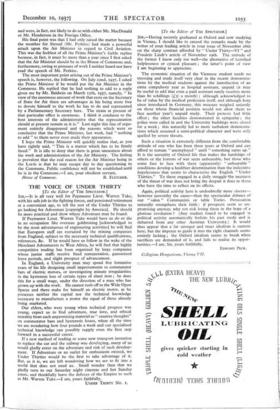[To the Editor of THE SPECTATOR.] Sta,—Havin g recently g raduated at
Oxford and now studying in Vienna, I should like to extend the remarks made by the writer of your, leading article in your issue of November 26th on the sharp contrast afforded by "Under Thirty—VI " and Fraulein Lindt's article of November 19th. The attitude of the former I know only too well—the alternative of horrified helplessness or cynical pleasure; the latter's point of view I am beginning to appreciate.
The economic situation of the Viennese student needs no stressing and made itself very clear in the recent demonstra- tions by the medical students against the introduction of an extra compulsory year as hospital assistant, unpaid (it may be useful to add that even a paid assistant rarely receives more than 8o schillings (£3) a month) ; although acknowledged to be of value by the medical profession itself, and although long since introduced in Germany, this measure weighed unjustly on those whose financial position would not allow them to face another year's unpaid study. Their protests had little effect; the other faculties demonstrated in sympathy; the police were called in and the University buildings were closed for a week; this naturally led to more turbulent demonstra- tions which assumed a semi-political character and were only quelled by severe threats.
Such a situation is extremely different from the comfortable attitude of one who has been three years at Oxford and can afford to remain " unemployed " until "something turns up." It is the unreality of Oxford life that makes the hardships of others or the horrors of war seem unbearable, but those who come face to face with these (apparently) " unbearable " conditions develop a healthier determination than the indecisive hopelessness that seems to characterise the English "Under Thirties." To those engaged in a daily struggle the nearness of the threat of war does -not bring the despair it does to those who have the time to reflect on its effects.
Again, political activity here is undoubtedly more sincere— however unworthy the cause—than the spectacular debates of our " salon " Communists or table Tories. Persecution naturally strengthens their faith : if prospects seem so un- promising anyway, why not risk losing them in the hope of a glorious revolution? (Any student found to be engaged in political activity automatically forfeits his past study and is debarred from any other Austrian University.) It would thus appear that a far stronger and truer idealism is current here, but the impetus to guide it into the right channels seems entirely lacking; the Oxford idealism seems to break when sacrifices are demanded of it, and fails to realise its oppor- tunities.—I am, Sir, yours faithfully, Collegium Hzingaricum, Vienna VII. EDWARD PECK.






















































 Previous page
Previous page